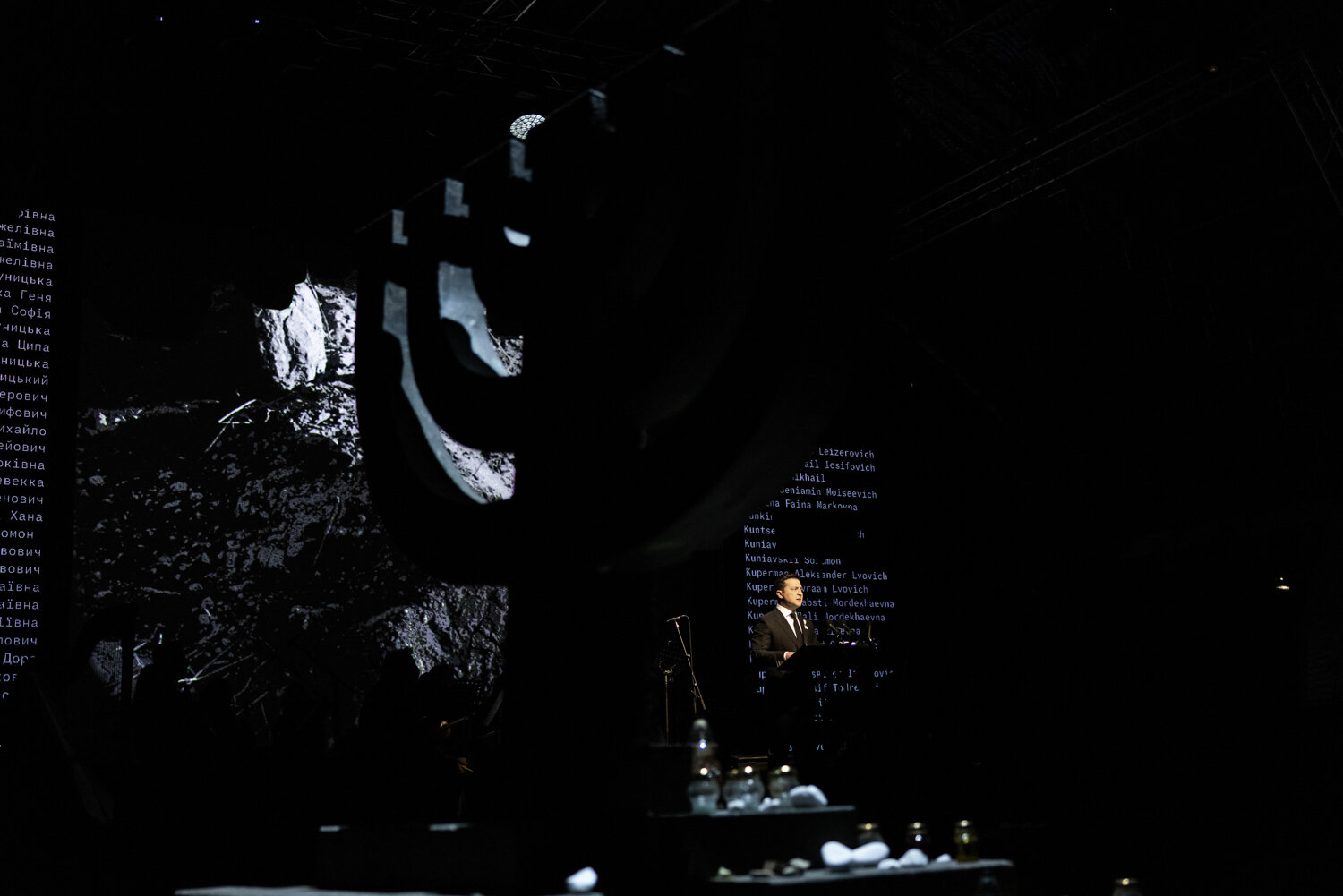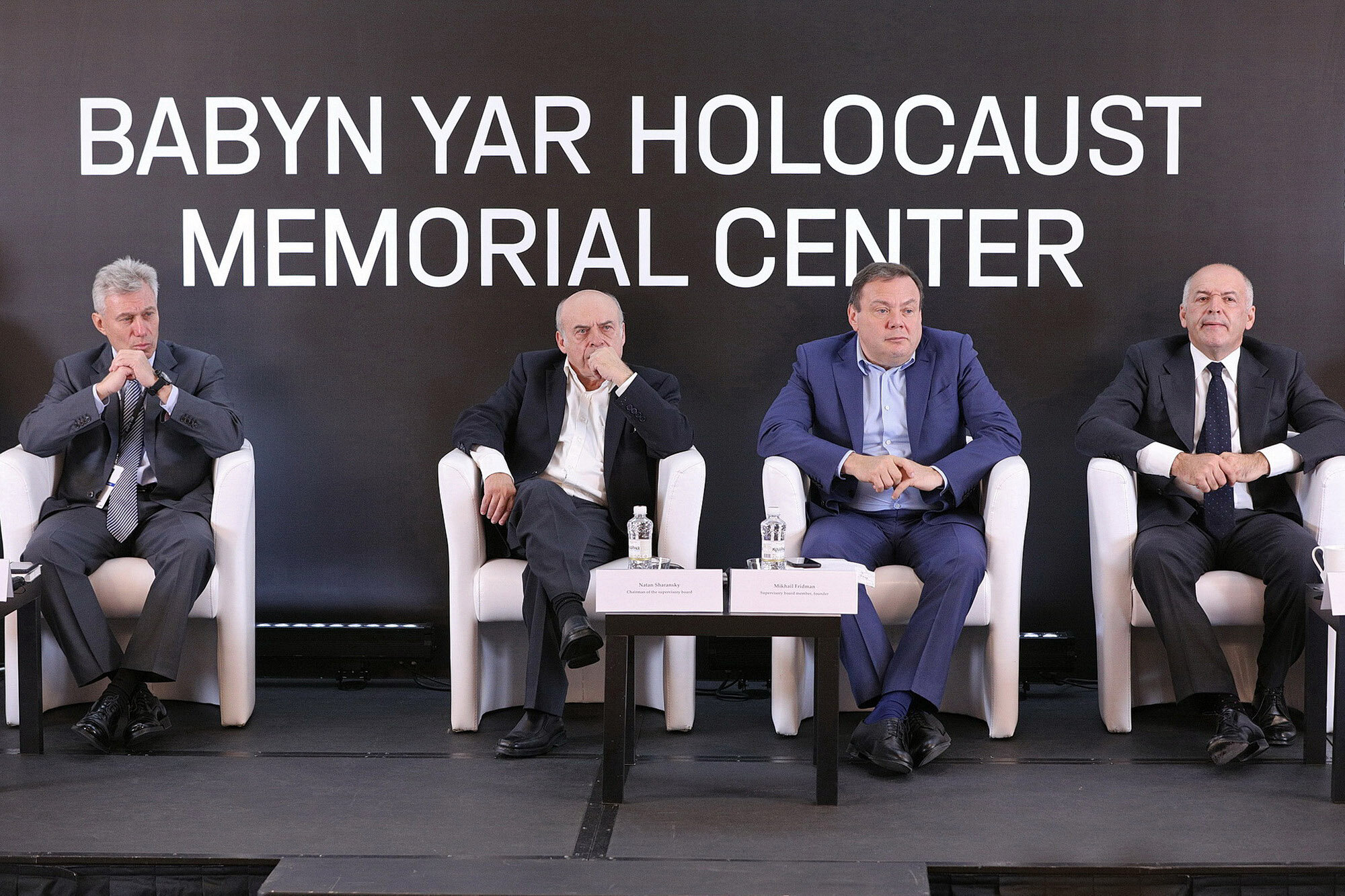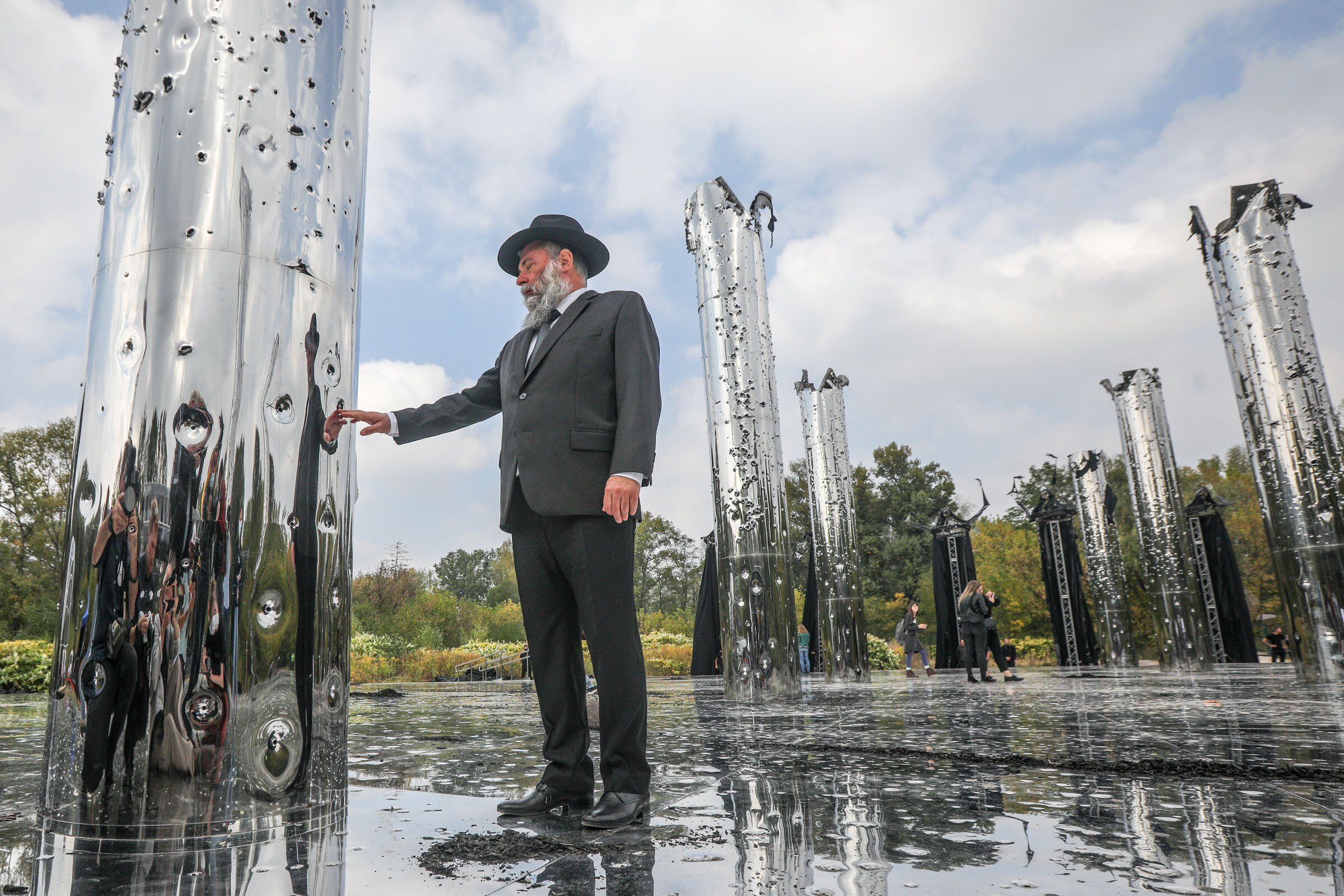While the presidents of Ukraine, Israel and Germany participated in the official Oct. 6 commemoration ceremony for the victims of Babyn Yar in Kyiv, many in the public were perplexed: Why is this event co-organized by a private institution with Russian sponsors?
The answer may be simple: It has the energy of $100 million in promised investment.
Money helped the project attract world-class artists to create high-tech commemorative art pieces at the site where there used to be only a few scattered old monuments. This won the support of President Volodymyr Zelensky’s government, eager to mark the 80th anniversary of the tragedy on the highest level.
“There were many statements, many promises, presentations, concepts, and in total — many years without a decent memorial complex in this place. I am happy that after so many arguments, obstacles, different ‘buts’ we finally started moving,” Zelensky said at the ceremony.
But critics believe that the most important stakeholder was ignored in this arrangement — the Ukrainian public. Many Ukrainians, including Jews, don’t want a private organization co-sponsored by Russian oligarchs to be responsible for how Ukraine remembers the largest Holocaust massacres on its territory.
“A private project that doesn’t have transparent procedures and doesn’t include the public should not monopolize such a sensitive subject for all Ukrainian society,” Ivan Kozlenko, the project’s vocal critic and former CEO of Ukraine’s Dovzhenko Center film institute, told the Kyiv Post.

Ukrainian President Volodymyr Zelensky speaks during the official commemoration ceremony for the victims of Babyn Yar in Kyiv on Oct. 6, 2021. (Ukrainian president press servic)
Memory politics
There are many issues to consider: How will the project shape the public understanding of alleged Ukrainian collaborationism that helped the German forces gun down 33,771 Jews in the Babyn Yar ravine on Sept. 29–30 in 1941?
Or how inclusive will it be in memorializing other victims of Babyn Yar — Roma, Ukrainians, Soviet prisoners of war, psychiatric patients — and others among some 100,000 killed there with Jews during the next two years of occupation? Will it recognize the role of locals who risked their lives to save Jews?
The project’s co-founder and major donor is Russian billionaire Mikhail Fridman, who has ties to Russian President Vladimir Putin as one of the country’s richest oligarchs. Fridman says that the project will not downplay acts of collaborationism nor ignore the many Ukrainians who saved Jews.
“The most important is to adhere to historical facts as accurately as possible,” Fridman said at a press conference of the project’s supervisory board on Oct. 6.
Still, critics are skeptical. The most forceful among them is Yosyf Zissels, a former dissident and a leader of the Ukrainian Jewish community. He sees the project as part of Russia’s “hybrid war” against Ukraine, Putin’s Trojan horse aimed at showing Ukrainians as anti-Semites and neo-Nazis unable to build their own memorial.
“How can it be that Putin, who fights us, killing people, committing violence and annexing territories, allows his subordinates to spend $100 million in Ukraine on a cultural project?” Zissels told Ukraine World media.

From left, members of the supervisory board of the Babyn Year Holocaust Memorial Center: Russian billionaire German Khan, Soviet dissident and Israeli statesman Natan Sharansky, Russian billionaire Mikhail Fridman, Ukrainian billionaire Victor Pinchuk at the board’s press conference in Kyiv on Oct. 6, 2021. (Kostyantyn Chernichkin)
Money and prestige
The full name of Fridman’s project is the Babyn Year Holocaust Memorial Center. It was initiated in 2016 by Natan Sharansky, an ex-Soviet dissident and Israeli politician, with support from Kyiv Mayor Vitali Klitschko.
But money came from Fridman and his associate German Khan. Both are Ukrainian-born Jews, who claim to have real sentiments in commemorating the victims because they have relatives killed in the Holocaust on Ukrainian territory.
They created a foundation now also sponsored by Ukrainian-Jewish billionaire Victor Pinchuk and millionaire Pavel Fuks, and to a lesser extent by Ukrainian boxing champion Wladimir Klitschko and Ronald Lauder, U.S. billionaire and president of the World Jewish Congress.
The donors became part of the project’s supervisory board with Sharansky as head. They invited highly respectable people to join: chief rabbi of Kyiv and Ukraine Yaakov Dov Bleich, former UNESCO Director-General Irina Bokova, former Polish President Aleksander Kwasniewski, former German Vice Chancellor Joschka Fischer and former U. S. Senator Joe Lieberman. Later, the first president of Ukraine Leonid Kravchuk also joined in.
Zissels, vice president of the Ukrainian chapter of the World Jewish Congress who knows many supervisory board members, says that “they must think it’s prestigious” and “don’t understand that it’s a part of hybrid war.”
“I don’t believe in the sentimentality of people with $20 billion,” Zissels told Time magazine about Fridman, whose current fortune is $16 billion, according to Forbes.
Scandalous overhaul
Critics believe that Fridman, by far the wealthiest among the supervisory board, is also the key decision-maker. According to former employees, Fridman was the one who imposed the appointment of a scandalous Russian film director Ilya Khrzhanovskiy as the project’s artistic director in 2019.
This led to a scandal in April 2020. Many scholars who developed the project’s mission, values and historical narrative resigned in protest against Khrzhanovskiy’s ideas and overarching authority. Former chief historian Karel Berkhoff said that the project had lost its “moral compass.”
Former chief of exhibition development Dieter Bogner called Khrzhanovskiy’s vision of the memorial center a “Holocaust Disney.” In his draft concept, Khrzhanovskiy suggested that each visitor to the memorial would “go on a challenging and sometimes shocking emotional journey with ethical choices at its core.”
Read more: Russian filmmaker’s overhaul of Babyn Yar memorial provokes scandal
Many also feared that Khrzhanovskiy would use some of the methods from his scandalous DAU film series that imitated a totalitarian Soviet “institute” in Kharkiv with scenes of unsimulated violence. In an open letter, activists from Ukraine’s cultural and scientific community demanded his dismissal.
The supervisory board refused to fire Khrzhanovskiy, but gave assurances that the ideas from his draft presentation were not seriously considered. Instead, Khrzhanovskiy presented his final concept in July 2021. The supervisory board also promised to restore the project’s public council, inviting all critics to join.
Public participation
In reality, none of the project’s real critics joined the public council. Instead, it was filled with loyalists and accidental people with no expertise, says Kozlenko, who signed the open letter. Kozlenko himself wasn’t personally invited and says that this council doesn’t represent the public interest.
“It (Fridman’s project) instrumentalizes democratic procedures, and they become a façade for a shadow management, which is typical for oligarchs,” Kozlenko told the Kyiv Post.
Journalist Andriy Kulykov joined this public council upon an invitation from the project’s management. He says there are few or none of the critics among the members and that it has a rather symbolic value.
“All public councils in Ukraine are created to divert, or draw the attention of society to the fact that they are there,” Kulykov told the Kyiv Post.
When asked by the Kyiv Post why there are no critics on the public board of the memorial center, Sharansky emphasized that he openly invited all signatories of that open letter to join, but none of them gave a positive answer. The public can join any board, but without the ability to make decisions, he says.
“All of our boards are absolutely open for public participation at all levels. And for the government, we also offer a role in making decisions,” Sharansky says.

A man touches the Mirror Field commemorative art object at Babyn Yar in Kyiv on Sept. 29, 2020, during a ceremony marking the 79th anniversary of the massacre. (Kostyantyn Chernichkin)
Ambitious plans
By the time the Ukrainian public got to see Khrzhanovskiy’s final concept for the memorial center, it was a done deal. He presented it on July 24 this year at the official governmental forum “Ukraine 30. Humanitarian Policy” as a concept that the government had already accepted without any real public discussion, the critics say.
Almost a year earlier, on the 79th anniversary of the Babyn Year massacre, Oleksandr Tkachenko, Ukraine’s minister of culture and information policy, and Ronald Lauder of the project’s supervisory board signed a memorandum of understanding and cooperation between the state and the memorial center.
Read more: Parliament passes bill banning anti-Semitism
At the forum, Khrzhanovskiy revealed plans to build the largest museum complex in Europe at the site of the tragedy spanning over 40,000 square meters. This will include the Museum of Victims of Babyn Yar, Museum of the Holocaust in Ukraine and Eastern Europe, Museum of the History of Oblivion of the Tragedy, Education and Science Center, Media Center and other buildings.
To mark the tragedy’s 80th anniversary, the memorial center has built three art installations: the wooden Babyn Yar Synagogue that unfolds like a pop-up book; the Mirror Field of reflective columns shot by bullets of the same caliber as those used in the massacre; and the Crystal Wall of Crying by famous contemporary artist Marina Abramovich. The first museum — Kurgan of Memory, shaped as an ancient Ukrainian burial mound, will open later this year.
While recognizing the artistic value of these objects, the critics are baffled by the speed with which the memorial center gets all the permits to build in the Babyn Yar, which is a national reserve territory. In February, Tkachenko appointed Rosa Topanova as the acting director of the site. Previously, Topanova worked in the law firm founded by the president’s chief of staff Andriy Yermak.
There is also Jewish tradition that the project will have to maneuver, since it prohibits building on burial grounds, which are all over the Babyn Year.
Critics led by Zissels believe that there was a Christian cemetery at the sight of the project’s wooden Babyn Yar Synagogue. The government examination revealed that the cemetery wasn’t used at least since 1929, and the memorial center was allowed to build the synagogue while not registering it as a proper building.
“This raises another important question: How can you realize things of a high moral order while doing it in an imperfect and immoral way? This is the main issue and negative aura that surrounds this private project,” Kozlenko says.
